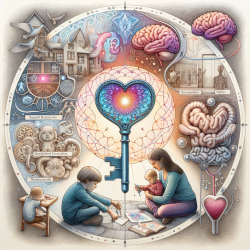Discover the Transformative Power of Oxytocin in Special Education
In the ever-evolving field of special education, practitioners are constantly seeking innovative approaches to improve outcomes for their students. One such groundbreaking development is the research on oxytocin, a hormone traditionally associated with childbirth and lactation, but now recognized for its profound impact on emotional and social behaviors.
Oxytocin: More Than Just a "Female Hormone"
The research article titled Fantastic Voyage: Chasing Oxytocin from the Bedside to the Bench and Back Again by Martha G. Welch provides a comprehensive exploration of oxytocin's role in modulating mother-child interactions and its potential to transform therapeutic practices. This research challenges long-held beliefs about brain-centric theories of behavior, emphasizing the importance of the autonomic nervous system and its influence on emotional regulation.
Key Findings and Implications for Practitioners
- Mother-Child Interaction: Oxytocin plays a crucial role in enhancing the mother-child bond, facilitating emotional connections that are vital for child development. Practitioners can incorporate strategies that promote these interactions to improve social and emotional outcomes.
- Gut-Brain Connection: The research highlights oxytocin's role in gut function and its potential to alleviate gastrointestinal issues commonly observed in children with autism. Understanding this connection can help practitioners address both behavioral and physiological symptoms.
- Emotional Co-Regulation: By fostering emotional co-regulation between parents and children, practitioners can create a supportive environment that promotes healthy development and reduces stress responses.
Encouraging Further Research and Application
Practitioners are encouraged to delve deeper into the findings of this research and consider how they can be applied in their own practice. By exploring the potential of oxytocin in therapeutic settings, educators and therapists can develop more holistic approaches to support their students' growth and well-being.
For those interested in expanding their knowledge, further research into the autonomic socioemotional reflex and its implications for therapy is recommended. This research underscores the importance of considering both physiological and emotional factors in the treatment of behavioral disorders.
To read the original research paper, please follow this link: Fantastic voyage: Chasing oxytocin from the bedside to the bench and back again.










